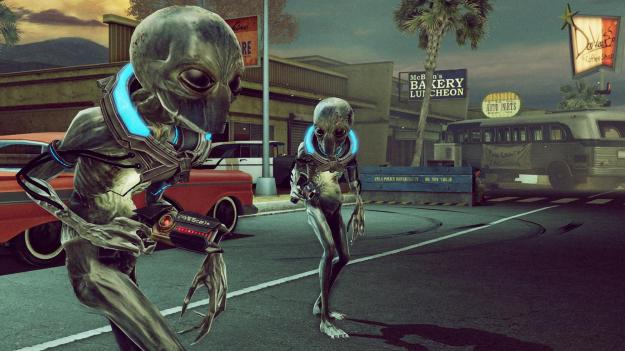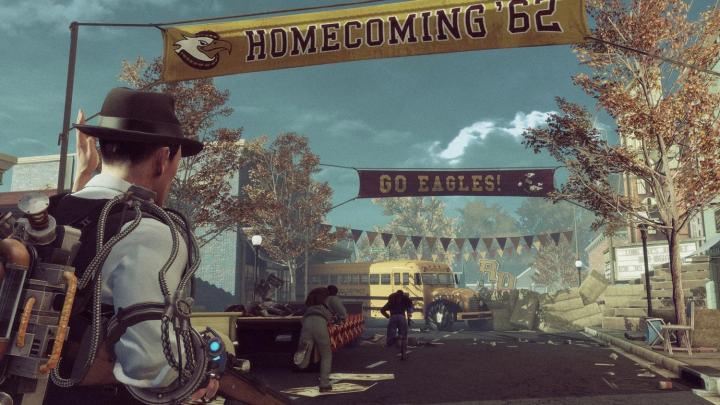
E3 2010 was a big year for XCOM fans. After years of stagnation for the beloved property, 2K announced that it would finally return, albeit not in the way most expected. The real-time strategy classic from 1994 had been revamped, and the turn-based gameplay replaced and reimagined as a first-person shooter. In 2012, the classic series would be reborn as XCOM: Enemy Unknown, but in 2010, fans saw a shooter. Some strategy was layered on top in 2011, but the game disappeared from sight after that, only to re-emerge two years later with a new look, a new perspective, and a new focus.
What happened? The story has all the intrigue, twists and lingering mysteries of a good alien conspiracy theory.

Following the release of BioShock in 2007, part of Irrational broke off and formed 2K Australia, which eventually became 2K Marin. The fledgling developer released BioShock 2 in 2010, and then announced the XCOM game as what looked like a straightforward first-person shooter. The game transformed in its E3 2011 appearance, with nearly 30 minutes of actual gameplay with newly added strategic elements that fall closer to what we now see in The Bureau.
The E3 2011 re-debut showed a game set in the early ’60s during America’s so-called “Golden Age,” with the Cold War as a backdrop. It centered around an alien incursion headed off by a group which would eventually form the earliest XCOM division. The gameplay placed a heavy emphasis on teamwork, but within the frame of a first-person shooter.
“We took a step back and looked hard at what the XCOM franchise demanded of us, that team plays a bigger part than that.”
After a few weeks of teasing, 2K made it official: The “XCOM Shooter” was revealed and rechristened as The Bureau: XCOM Declassified, and officially confirmed for release on August 20 for PC, PlayStation 3, and Xbox 360. The foundation of the game that appeared at E3 2011 survived – the setting remains 1962, you still play Agent William Carter, the group that will become XCOM is still fighting aliens – but the perspective had shifted from first- to third-person, and the philosophy behind the game changed as well.
“We took a step back and looked hard at what the XCOM franchise demanded of us, that team plays a bigger part than that,” Alyssa Finley, Executive Producer for 2K Marin told us. “So we really kept hitting the touchstones of tactics, tools, team, terror, and tension to try to make sure that whatever we were developing was really hitting those as much as possible, and making sure the agents were a key part of gameplay felt like a really important evolution for us.”
Changing the perspective from first- to third-person was a lengthy task, but it was an evolution of the game rather than a total reinvention. The earlier build was played in first-person, but when the player switched into what was initially called “tac mode” (since renamed “battle focus”) the game shifted perspective to third-person in order to give you a better sense of how to command your AI-controlled teammates.
This idea of managing the battlefield – so core to the tenets of the original XCOM series – helped 2K Marin to redefine the game. Tactical play is at the heart of The Bureau, and it was that single, driving idea that led to the change in perspective more than anything else.
“By the time we took first person out of the mix and went full third, it was, again, more of an evolution …
The change wasn’t the result of a single revelation. It came in small increments as 2K Marin continually adjusted the formula to find a balance that worked for its XCOM shooter. This gradual evolution contributed to the game’s nearly three year absence, but the task was not as monumental as it might seem. Time-consuming and exacting, yes, but built entirely off of existing code.
“It’s funny, because first- to third-person, we did it in such a gradual way,” Nico Bihary, Senior Producer on The Bureau told Digital Trends. “Every step of the way we had been building up a set of tools and a set of code that was about the current version of the game.”

“By the time we took first person out of the mix and went full third, it was, again, more of an evolution than a ‘OK, we’re not going to be able to play this game for six months because we’ve got to throw everything away and start again.’ There was always a game on screen that you could play, and what we were doing was trying to make it better and more playable, and get hands on it and say, ‘OK, what’s working, what’s not? Let’s keep going with what’s working.’”
Despite the delays, the game’s timing couldn’t be better. The release of Firaxis’ XCOM: Enemy Unknown in 2012 revitalized the franchise and reignited dormant interest from fans of the original while simultaneously creating a new fanbase. The game was considered both a commercial and a critical success, going on to win several Game of the Year nominations and awards. An upcoming re-release on the iPad should only help to increase the game’s popularity.
Make no mistake, though: The Bureau is not simply an extension of Enemy Unknown. It is an origin story that takes the property in an entirely new direction. The shift from real-time strategy to third-person shooter should also further the reach of the brand. And thanks to many of this year’s biggest games getting pushed to the fall to accommodate for next-gen consoles, The Bureau will arrive alongside a thinner-than-usual crowd of competitions.

“Throughout 2K, there’s a very collaborative vibe,” Bihary stated. “But as a group there’s always been a vision of what this product is going to be, exclusive of any outside direction. The Firaxis guys have always been great about offering their feedback, but for the most part: We knew that we wanted to tell an origin story, we knew that we wanted it to be in this setting, we wanted this contrast between what was normal and familiar at the time and this alien invasion. So we were pretty centered very early on, and very independent in terms of the direction we wanted to take with this.”
From vaporware to one of the biggest releases of 2013, The Bureau has fundamentally changed while still remaining true to its initial goals. The gameplay is considerably altered from that 2010 debut, and even from the 2011 re-debut, the core emphasis on tactics remains, however.
“We first showed it back in 2010 back at E3, and what we showed there was our first big idea as to how to really bring the XCOM universe to life from this ‘more boots on the ground’ perspective,” Finley told us. “And that really what we’ve been iterating on ever since is just how to make boots on the ground and XCOM really feel true to the XCOM franchise for the player.”
[UPDATE: Following the posting of this article, 2K Games contacted us to let us know that Irrational was never involved in the making of the XCOM shooter, and that any rumors to the contrary were incorrect. The article has been updated to reflect that.]
Editors' Recommendations
- XCOM Legends mobile spin-off launched by 2K
- Stand-alone XCOM spinoff Chimera Squad will release next week









